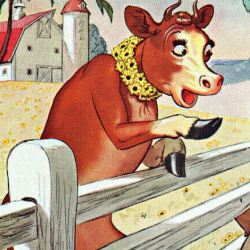When does Elsie, the Borden cow, go from being an icon to being a Big Mac? When do children and adults decide which animals are pets, and which are eligible to be eaten? A new study suggests these decisions begin when we are tweens.
For a long time, I liked eating octopus; until the day I saw a documentary and decided they were “too smart” to eat [1], and then I stopped. Of course, pigs are as smart, if not smarter, but I continue to eat bacon because pigs are just too tasty. That ethical contradiction lies within many of us, and we often resolve the tension by categorizing us and them. (It holds for politics as well)
Our food choice has a significant cultural component; what may be a pet in one culture is a tasty snack for another; an animal may be sacred for some, and a cog in a factory farm for another. The researchers wanted to discover when humans begin to categorize and prioritize animals, what they defined as speciesism – determining the “moral worth” based upon a creature's species. These categories come readily to mind, pets, predators, pests, or vermin. As the researchers point out, studies have shown that how we categorize an animal often determines what we believe are their cognitive, sentient abilities – cows are dumb, dogs and cats are intelligent.
Our youngest form categories of animals based upon their form and sounds; then based upon their domesticity, their ability to be a pet. Edibility may become a category somewhere around 6 to 10 years of age. The researchers also note that children in these age groups are concerned about the moral concept of “harm aversion” and that they prize that imperative over other category membership.
The question wanted to pursue was when harm aversion became less of an issue than edibility. To get at an answer, they utilized a survey to define how the participants,
- Categorized animals, i.e., farm animals as food or pets
- Felt animals should be treated, i.e., again, farm animals versus pets
- Whether it was morally permissible to eat animals and animal products
- Speciesism – was an animal’s moral worth determined by their species membership, e.g., “it is okay to test new medicines on animals that we wouldn’t test on humans” on a 7-point scale of strongly disagree to strongly agree.
479 participants, more female than male, from three age groups. 9 to 12-year-olds, recruited from a metropolitan area, 18 to 21-year-olds recruited from universities, and adults, aged 29 to 59, recruited from the general population.
Findings
- With age, participants were more likely to categorize a farm animal as food rather than a pet
- Children “perceived that farm animals ought to be treated better than both young adults and adults.” There was no difference based on age in how we should treat our pets.
- Young adults felt that humans should treat other humans better; children and older adults did not make that differentiation.
- Children felt eating animals, or animal products was less morally permissible than young or older adults.
- Children show less speciesism than young or older adults, who share equal degrees of speciesism.
“…children did not perceive pigs ought to be treated any differently than humans or dogs, whereas young adults and adults reported that dogs and humans ought to be treated better than pigs.”
As we grow older, we begin to categorize animals as food rather than companions, and it seems we suppress concerns about how they may be treated or their sentient qualities. It starts in that six to 10 age range and appears complete by our late teens and early twenties. To quell the difference between Elsie and a Big Mac, “adults have been shown to objectify food animals.” This is not the case for children, although, as the researchers point out, children create hierarchies.
“We found that children think that chimpanzees ought to be treated better than pigs, and pigs better than rats.”
As I mentioned early on, choosing our animal foods is bound tightly to our culture and society. The specific findings of this study pertain more to the British than, say, the Chinese or Indians. As with much good research, the study raises more questions than it answers. That said, it does offer some insight into how we answer the question of “what’s for dinner?”
[1] Yes, I know they were not smart enough to get caught.
Source: Development Of Speciesism Social Psychological and Personality Science DOI:

